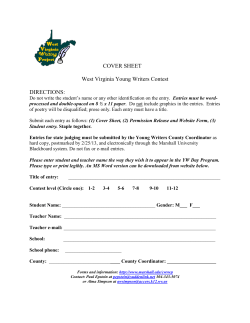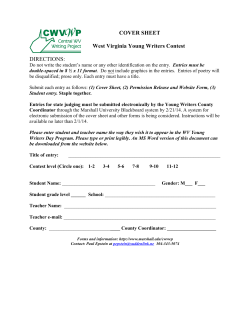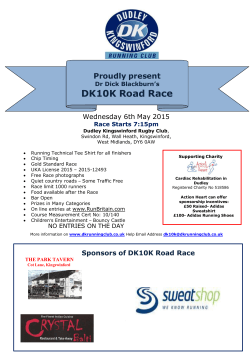
2015_CIRT Design Competition Package
CIRT DESIGN COMPETITION AWARDS PROGRAM 2015 PROGRAM INFORMATION PACKAGE Imagination is more important than knowledge. Albert Einstein physicist A PARTNERSHIP PROJECT WITH THE ACE MENTOR PROGRAM OF AMERICA CONSTRUCTION INDUSTRY ROUND TABLE (CIRT) 2015 DESIGN COMPETITION AWARDS PROGRAM A Partnership with the ACE Mentor Program of America AWARDS PROGRAM The CIRT/ACE Award competition is maintained, coordinated, and judged by Construction Industry Round Table’s CEOs and is intended for ACE Mentor Affiliates. Winning teams representing the Affiliates will receive a monetary award which they can put to scholarships and/or to support the operations and needs of the Affiliate. PROGRAM SPECIFICS Sponsors: CIRT, ACE Mentor Program of America, and on a voluntary basis some individual CIRT firms. Theme for the Program: Celebrating the innovations and contributions the design/construction community makes to the quality of American life, while understanding the issues and challenges the industry faces to deliver on this legacy. Award Approach: Any ACE Mentor Affiliate/Chapter can volunteer to participate in the CIRT Design Competition, which uses actual design challenges adapted and/or modified to accommodate the competition’s parameters. The true goal is to judge the ability of the students to make a reasoned, coherent, well thought out, clear presentations on their team’s design/construction approaches within the project’s objectives and/or constraints, etc. Definition of a Team: The entries to the competition must be by a team comprised of three or more students. The intent is to encourage group dynamics that require assignments, compromise, and consensus building. [NEW] Multiple Teams from One Affiliate: CIRT ardently requests and recommends that Affiliates with more than one team contemplate submitting entries in the different challenges rather than multiple ones in the SAME category. It would greatly increase the value of the competition and improve the odds of having one of the teams among the recognized entries. Program Schedule: The annual event is announced in the early fall and officially begins in January concluding at the CIRT Spring Conference (usual held in late April or early May) – where the winner(s) will be selected and announced. [Interim milestone and final submittal dates are included in this competition package]. Program Awards: CIRT has made a commitment to finance prizes for the top awards and to provide some logistical/travel expense stipends (e.g. to cover the costs to attend the final round as the Affiliate/Chapter best determines). PRESENTATION The presentation BOARDS submitted for the competition (will be retained by CIRT) are extremely important because they will be used to make the initial cut down to three finalists. The design boards therefore must be clear, concise, complete, and well thought out with sufficient and compelling information to stand independently from any written narrative or report. [The judges are looking for clarity, understandability, constructability, completeness, flow of ideas and how the proposed solution realistically and fully meets the challenge]. Drawings should be on a maximum of two (841mm x 594mm) panels and must be mounted on two A1 lightweight boards. A brief written explanation describing something about the context and thinking behind the scheme should be included on the board(s). Photographs (of the site, 3D model, etc) may be mounted or scanned onto the displays. No specific drawings or scales are prescribed, but the presentation must convey the ideas underlying the design (whether a building or not), its overall forms and spaces, its character and atmosphere. A narrative addressing the design process (as described below), among other things should accompany the drawings. [Finalist will be required to provide a digital copy of their entry]. REGISTRATION ALL teams MUST complete and submit the “Registration Application Form” with the display boards. [FAILURE TO PROVIDE THIS FORM MAY RESULT IN NOT BEING JUDGED IN THE COMPETITION]. The registration form is critical for the competition to maintain contact with the teams and to establish identification of the various entries with their authors. Thus, the forms must accompany the entry and should also be attached to the back of the display board(s) themselves. DESIGN PROCESS The following questions are representative of the type of information that would be expected along with the design concepts, renderings, etc. (Please note: Jurors will carefully consider your replies to these questions when evaluating your overall project as they work thru your BOARDS.) Question A: Define and/or describe the problems/challenges you faced when deciding on the design project you chose to do for the competition. Question B: Thoroughly describe your design process, in writing and through visuals on the boards (e.g., sketches, renderings, stepped process, before and after, budgets, timelines, etc.) Question C: Explain how your design approach is an appropriate, innovative solution that realistically responds to the precise design competition problem. Explain how your design is different from other approaches or processes, if such is the case; and/or meets budgetary constraints, timeline issues or other challenges. Question D: Describe any social/ecological or otherwise beneficial qualities of your design solution. (For example, is it a universal design? How? Is it environmentally friendly? Does it use cost-effective or recyclable materials?) Question E: Describe what you learned from this design competition. DESIGN ASPECTS/CONSTRUCTION ELEMENTS The following design/construction aspects will be evaluation criteria, and should be explained where appropriate: � site selection and its context (built and/or natural) � constructability (structural challenges, materials, textures, colors, etc.) � strategy for sustainability � surrounding landscape/external spaces � life and activities, in and around the building, including the qualities of enclosed spaces showing furniture, fittings and finishes (where needed or appropriate to the design competition selected). JUDGING The panel of judges will be mainly compromised of CIRT member CEOs of the leading design and construction firms in the United States. As such, the overall theme or evaluation criteria for the competition is one founded on the practical aspects of the profession, particularly with respect to constructability, use of materials, meeting deadlines, and establishing realistic/reasonable expenses or budgets. More important than the actual design solution, is the methods and processes used to arrive at a solution. Fundamentally, the spirit of this competition is one of design and construction. During the final round, great weight will be given to the ability of the ACE students (i.e. their selected representative) to articulate a clear, comprehensive, coherent, and cogent presentation that persuades the judges as to selecting his/her team as the winning entry. (Preparing the student representative is part of the overall process that the other team members will receive benefit from as well). TIMELINE Those ACE Affiliates/Chapters that wish to participate in the national competition must comply with the following time schedule: March 13, 2015 – All entries must be POST-MARKED for submittal to the CIRT national office in Washington DC by this date. [8115 Old Dominion Drive, suite 210, McLean, VA 22102] April 3, 2015 – Finalists are notified and plans are made to bring a representative(s) from each group to Washington, DC. [A stipend will be established for each team to be used to cover cost to attend the final round as the Affiliate/Chapter best determines]. April 15, 2015 – On or about this date, mentors and students will need to have made their hotel reservations in DC. [The finalists will be notified with precise hotel information at the time of their selection]. April 27, 2015 – Finalists present to the CIRT Panel of Judges. The panel of judges vote to determine the order of finish. The winner will be announced and presented to all attendees at the CIRT conference. [Exact information on date, time, and place will be provided finalist]. Resources/Information Mark A. Casso, Esq. President Construction Industry Round Table 8115 Old Dominion Drive, Suite 210 McLean, VA 22102 202.466.6777 - office mcasso@cirt.org John Strock Executive Director ACE Mentor Program of America 150 S. Washington Street, Suite 303 Falls Church, VA 22046 703.942.8101 - office 703.942.8651 - fax jstrock@acementor.org PRINTING/BOARD RESOURCES (Local to CIRT) ABC Imaging th 1120 20 Street, NW Suite 102-103 Washington, DC 20036 703/848-2997 www.abcimaging.com ARC 8245 Boone Blvd. Vienna, VA 22182 703/893-0335(o), 703/893-0336 (f) www.e-arc.com CIRT DESIGN COMPETITION AWARD PROGRAM 2015 PROJECT/OPTION CHALLENGES OR RFP’S List of Project Options/Challenges (select one RFP for the competition): City Centre Challenge Transportation/Road System Challenge Health Clinic Challenge City Centre Challenge Entrants are challenged to generate innovative ideas for renewing your town/city center. The overarching intent is to explore how the physical presence of the city can become a more economically thriving and aesthetically vibrant place reflective of the natural beauty of the region, and the character of the community. Submissions must explore the ways your town/city can transition its “center” or heart into a lively and sustainable future. The objective is to identity a cohesive vision for a long-term successful future thru CONSTRUCTION related changes (the built environment, whether rehab/new/repurposed structures, or opening spaces, etc.). This is an ideas competition: proposals may be innovative, transformative, and challenging, BUT should also present viable ways to implement real, holistic change. Successful proposals will show before/after, new uses, etc. – with a cost estimate that must be realistic and doable for the resources/financial support likely available in the locale. [The proposal should focus or concentrate on an identifiable square block or a few blocks – NOT the entire town]. Transportation/Road System Challenge Every community has transportation challenges, whether road related, congestion, or alternative transport possibilities. This challenge is to identify specific transportation problems or opportunities that can be addressed thru CONSTRUCTION related solutions and present them in a compelling way. The team should select the area of concern, define the problem and possible solutions (whether new roads, bridges, tunnels, etc. and/or alternative modal means of transport) – justify the selection and lay-out the solutions as well as provide a cost estimate to address the needs that is realistic and doable for the resources/financial support likely available in the locale. Due to the likely displacement and logistical problems a transportation project will create in a community, the proposal MUST include the precise steps, stages, and remedies for these problems. Health Clinic Challenge Create a meeting point for individuals, families, and visitors, in need of medical treatment, checkups, and therapy that will present a whole-life feeling and reduce or eliminate the fear, anxiety, and boredom often associated with visiting medical clinics. The DESIGN/CONSTRUCTION features of this facility (which can be a single building or a campus of buildings) MUST BE the KEY to create a place where openness and diversity prevail -- where children, young people, and adults all feel at ease (whether they are the patient or just accompanying such a person). Consider this as an integrated clinic serving both your local community and possibly the surrounding area or region – and so it should reflect “the style” of the area it will serve. Central to any design should be the incorporation of elements that help facilitate the medical interaction (enhance flow, comfort, and recovery) as well as address the needs of accompanying individuals, regarding waiting times, diversions, and entertainment. The underlying goal of the design/construction proposal: find innovative ways to make something that is in general done with “dread” into something that has some enhancing aspects. Use of materials, building techniques, and approaches that emphasize sustainability, energy efficiency, and recyclable eco-friendly products as well as being equipped with the latest smart building and security technologies should be integral to the design proposal. [The structure may be of your own dimensions and sited on a plot of your choosing, but these decisions MUST be fully explained and in keeping with the overall budget and resources that are likely to be attracted to such a project. To that end, a budget based a price per square foot MUST accompany your proposal. Also, for extra award points, consideration of how your proposal could be applicable to “third world” medical clinic needs should be presented]. Multiple TEAMS from ONE Affiliate/Chapter CIRT STRONGLY requests and recommends that Affiliates with more than one team consider submitting entries in the different challenges rather than multiple ones in the SAME category. It would greatly increase the value of the competition and improve the odds of having one of the teams among the recognized entries. Please Note The project options for the CIRT Design Competition may have been derived from actual competitions that are underway or have been recently completed. The information furnished has been edited and/or modified so as to meet the needs and form the basis of the CIRT competition. If for any reason you believe a key piece of information is missing or you are unclear as to a specific reference in the information provided – please make an educated guess or assumption that would further your proposal (and simply indicate what that assumption was and why you made it). Please do not let a geographical reference or other individual piece of information prevent you from completing the CIRT design competition submission!
© Copyright 2025









